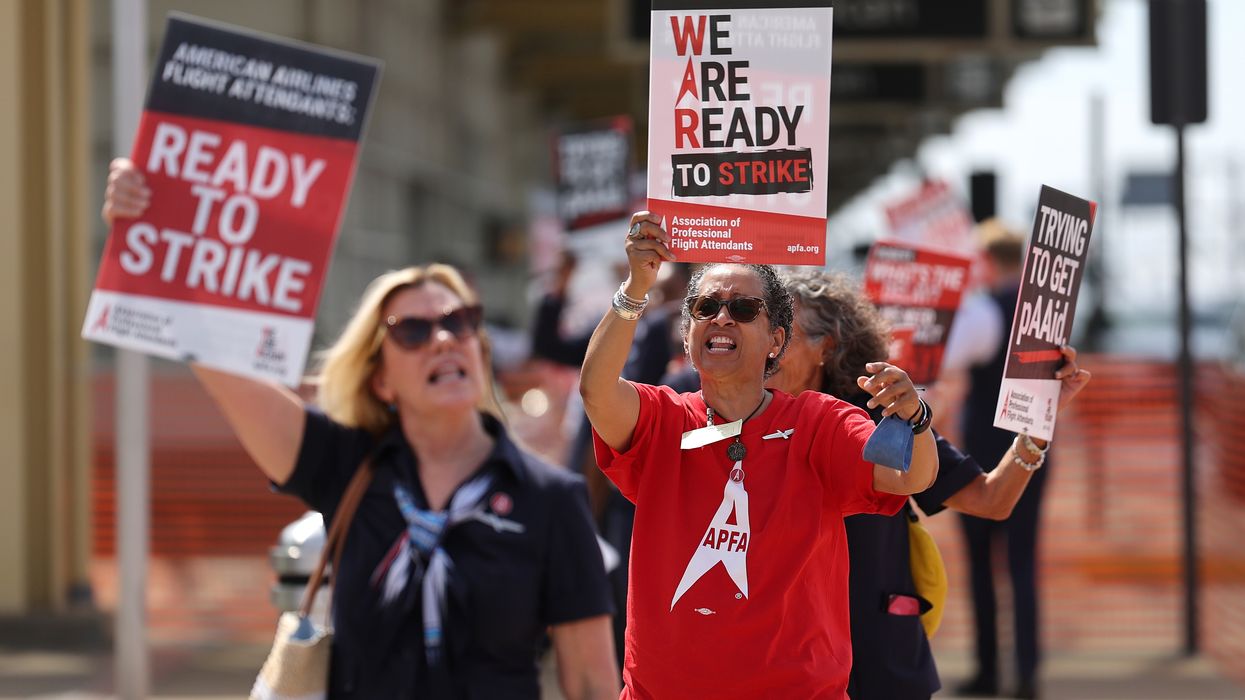Watchdog Warns DOGE Cuts to FAA Make Next Airline Disaster 'More Likely'
"Maybe in the DOGE boys' video game simulations, it doesn't matter if they lay off hundreds of staff from the FAA. In the real world, however, it will make flying less safe," said Public Citizen's Robert Weissman.
As the Trump administration began firing hundreds of Federal Aviation Administration employees amid a surge in plane crashes, a leading U.S. consumer advocacy group warned Monday that the slash-and-burn approach of Elon Musk's Department of Government Efficiency is making the "next air travel disaster more likely."
While Musk recently said that DOGE will "aim to make rapid safety upgrades to the air traffic control system," critics have countered that the Trump administration's termination of FAA personnel, including critical air traffic control maintenance staff, poses major risks.
"Maybe in the DOGE boys' video game simulations, it doesn't matter if they lay off hundreds of staff from the FAA. In the real world, however, it will make flying less safe," Public Citizen co-president Robert Weissman said in a statement. "Just like having fewer people safeguarding the nation's nuclear arsenal will make the risk of a nuclear accident much greater."
Elon’s DOGE rampage will be a wake up call for what a decimated government really means. Cuts to FAA? Higher risk of plane crashes. Cuts to Forest Service? Higher fire risk. Cuts to the CDC? Higher pandemic risk. Cuts to the EPA? Higher toxic exposures risk — and on and on.
[image or embed]
— Public Citizen (@publiccitizen.bsky.social) February 17, 2025 at 11:03 AM
Weissman continued:
The Musk rampage through government is making it virtually certain that we will suffer through otherwise avoidable health, safety, and economic catastrophes. Cutting the Forest Service increases fire risk, cutting the [Centers for Disease Control and Prevention] and blocking information-sharing risks worsening infectious disease outbreaks, cutting the [Consumer Financial Protection Bureau] guarantees Big Bank and predatory loan ripoffs, cutting [Food and Drug Administration] staff increases the risk for dangerous devices, drugs, and food additives, cutting the [Environmental Protection Agency] will increase the risk of mass toxic exposures, and on and on.
"If permitted to proceed, the mindless Musk-Trump governmental annihilation is going to touch every American community, imposing tragedy upon tragedy," Weissman added.
In a Monday social media post, U.S. Congressman Don Beyer (D-Va.) said that "mass firings of FAA workers—at a time when they already have serious staffing problems—would be dangerous at any time," but "Musk and Trump doing this weeks after the deadliest crash in years is stupid beyond belief."
Public Citizen's warning came on the same day that a Delta Air Lines flight from Minneapolis to Toronto crashed and overturned on landing. The FAA said all 80 people aboard the flight were rescued. At least a dozen people were injured in the crash, three of them critically, according to the Toronto Star.
While the FAA firings were not a factor in Monday's accident, the Toronto crash was the latest in a recent surge in air disasters. Last month, 67 people were killed when an American Airlines jet and an army helicopter collided at Ronald Reagan Washington National Airport in Washington, D.C. According to initial reports, only one air traffic controller was working both civilian and military flights when the crash occurred.
On January 31, seven people died when a medical transport jet crashed near Philadelphia, 10 people were killed in a February 6 Bering Air commuter flight crash in Alaska, and one person died when a private plane belonging to Mötley Crüe singer Vince Neil crashed during landing in Arizona last Monday after its landing gear failed to properly deploy.
We condemn the decision to fire these safety inspectors. Everywhere I go I am asked, “is it safe to fly?” My response is yes because thousands of frontline workers ask that all day long. If federal workers can’t do their jobs, we can’t do ours. 1/2 www.passnational.org/index.php/ne...
[image or embed]
— Sara Nelson (@flyingwithsara.bsky.social) February 15, 2025 at 1:59 PM
David Spero, national president of Professional Aviation Safety Specialists, the union representing more than 11,000 FAA and Defense Department personnel who install, inspect, and maintain air traffic control systems, said in a statement Saturday that the Trump administration's terminations "will increase the workload and place new responsibilities on a workforce that is already stretched thin."
"This decision did not consider the staffing needs of the FAA, which is already challenged by understaffing," Spero added. "Staffing decisions should be based on an individual agency's mission-critical needs. To do otherwise is dangerous when it comes to public safety. And it is especially unconscionable in the aftermath of three deadly aircraft accidents in the past month."


